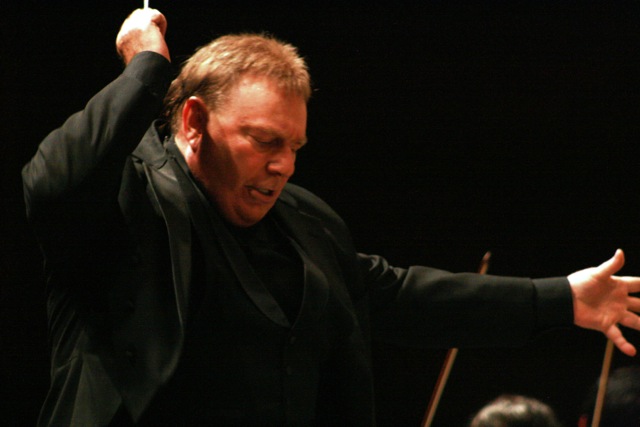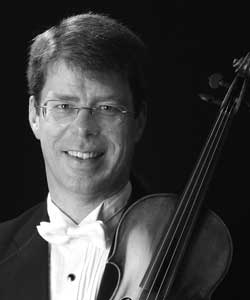Chicago Philharmonic closes its season with romantic mix
The Chicago Philharmonic is closing its season in high style. In late March the orchestra accompanied the Joffrey Ballet to New York, providing live music for the Joffrey’s first New York engagement in 21 years. From April 26 to May 7 the Philharmonic will be at the Auditorium Theater for Joffrey performances that include Bartok’s ballet, The Miraculous Mandarin.
And, most importantly, on Sunday afternoon at Evanston’s Pick-Staiger Concert Hall, the Chicago Philharmonic closed its symphonic season with an exciting concert of works by Shostakovich, Dvorak and Franz Waxman. Led with gusto by guest conductor Gerhardt Zimmermann, it was a performance full of surging romanticism with a dash of extravagant solo pyrotechnics.
The afternoon’s featured soloist, violinist Robert Hanford, provided impressive helpings of both. Concertmaster of Lyric Opera Orchestra, he frequently fills that position with the Chicago Philharmonic as well. In the spotlight as guest soloist, he played with a powerful, full-bodied tone that rose effortlessly above the orchestra in Dvorak’s lyrical Romance in F minor and Waxman’s Carmen Fantasy, a blazingly showy compendium of tunes from Bizet’s opera.
In the Dvorak Romance, Hanford brought a rich, sculpted line to the poignant main theme, allowing the long opening notes to fill the air before unleashing a quiet flurry that briefly whirled away like a wind-swept flower petal. In the upper reaches of Dvorak’s tender melodies his violin sounded sweet and youthful, while a hint of mature melancholy crept in when the music descended. His tone was seamless and strong throughout, with nary a weak link as he shifted registers.
Hanford’s impeccable intonation and high-speed fingerwork were literally breathtaking in the Carmen Fantasy. Zimmermann set a blistering pace, and Hanford had no difficulty keeping up, matching the racing orchestra and raising the ante with florid solo passages. He masterfully conjured up both sides of Bizet’s Carmen, allowing the siren song of the seductive, temptress to smolder but also hurling himself headlong into the wild frenzy of the heedless, fatalistic gypsy.
The concert opened with Zimmermann’s arrangement of Shostakovich’s String Quartet No. 7 for string chamber orchestra and percussion. In remarks before the work, Zimmermann spoke about the dangers Shostakovich faced as a creative artist under Stalin’s repressive regime. In his Chamber Symphony in F-sharp minor, Zimmermann aimed to emphasize the profound fears that he believed lurked beneath the string quartet’s already unsettled surface. He wanted to summon up the dreaded “knock on the door” from Stalin’s KGB and the “twisting of the knife in the back,” both terrifyingly real possibilities that Shostakovich lived with for decades.
Zimmermann’s arrangement had all the tensile lines and skittish energy of Shostakovich’s original. The orchestra moved deftly from resolute, sweeping unison to wandering like dazed survivors in a desolate landscape in the second movement. But after a while, the percussive punctuation, the sharp metallic jabs and bullying, arrogant drums, became overly literal.
A vibrant reading of Dvorak’s familiar “New World” symphony, full of both fiery energy and meditative calm, closed the concert. The orchestra’s brass sounded burnished and noble, and the winds, particularly principal clarinet Linda Baker, added both bright and subtly nuanced color.
Before each Dvorak piece and the Carmen Fantasy, poet Richie Hofman read a short poem of his own. What could have been an awkward gimmick turned out to be very evocative. Hofman’s images of a flower’s heady perfume set the stage beautifully for the contemplative, nostalgic mood of Dvorak’s Romance.
Posted in Performances






